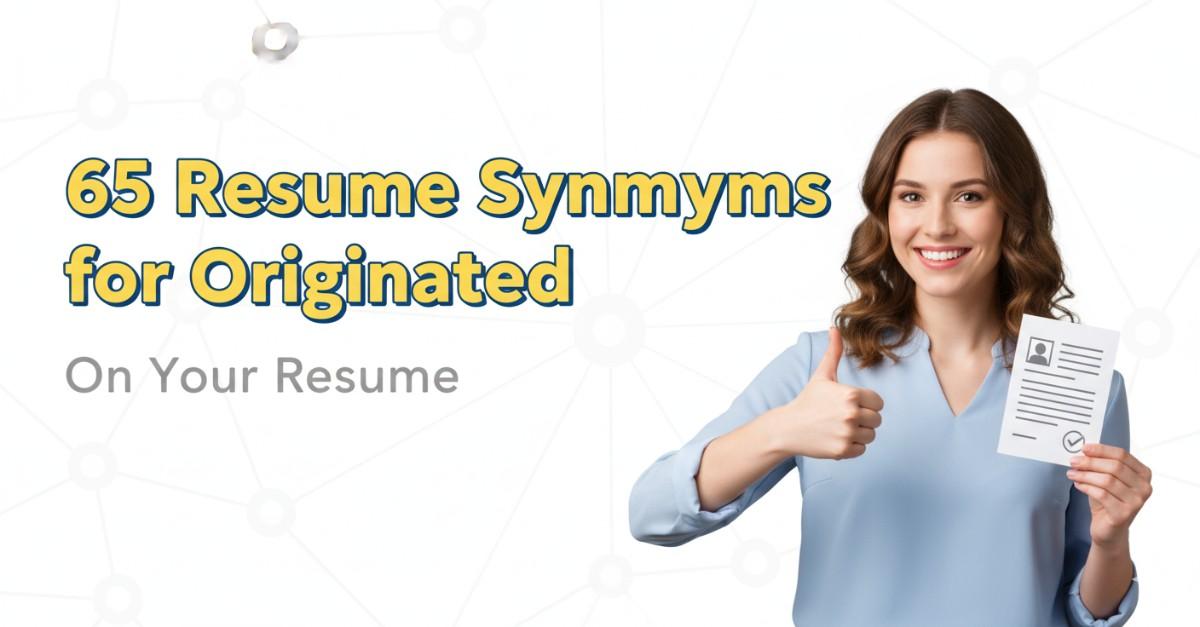
63 Resume Synonyms for Versatile To Use On Your Resume
Using the term “versatile” on resumes has become quite common, often leading to its overuse and diminishing impact. While it may initially convey adaptability, relying on this single descriptor can suggest a lack of creativity and fail to capture the nuanced skills that candidates possess. Recruiters today are inundated with resumes, and repetitive language can make it challenging for your application to stand out in a sea of similar candidates. This guide will explore why varied vocabulary is essential in effectively communicating your strengths and experiences. By diversifying your word choice, you not only enhance readability but also provide a more dynamic representation of your professional capabilities. We will delve into effective synonyms for “versatile,” offer tips on how to incorporate them into your resume, and provide examples that illustrate the difference between generic and impactful language. Elevating your resume with thoughtful word selection can significantly improve your chances of making a memorable impression on potential employers.
- Why Synonyms for “Versatile” Matter on Your Resume
- The Complete List: 63 Resume Synonyms for Versatile
- Strategic Synonym Selection by Industry
- Power Combinations: Advanced Synonym Usage
- Common Mistakes to Avoid
- Quantification Strategies for Maximum Impact
- Industry-Specific Example Sentences
- Advanced ATS Optimization Techniques
- Tailoring Synonyms to Career Level
- The Psychology of Leadership Language
- Final Best Practices
- Key Takeaways for Strategic Synonym Usage
- Frequently Asked Questions
- How many different synonyms should I use in one resume?
- Can I use the same synonym multiple times if it fits different contexts?
- Should I always replace ‘Versatile’ with a synonym?
- How do I know which synonym is most appropriate for my industry?
- Do synonyms really make a difference in getting interviews?
- Related Resume Synonym Guides
Why Synonyms for “Versatile” Matter on Your Resume
Using synonyms for ‘versatile’ on resumes is crucial for several reasons. First, overusing the term can lead to monotony and predictability, making your application blend in with roughly 70% of professional resumes that feature the word. This redundancy can cause your unique skills and experiences to be overlooked. Additionally, relying solely on ‘versatile’ misses the opportunity for specificity, failing to convey the distinct ways you can adapt and contribute in various situations. Synonyms can enhance the impact of your statements, ensuring they resonate more powerfully with hiring managers. Furthermore, many Applicant Tracking Systems (ATS) are programmed to recognize diverse vocabulary, so incorporating varied terms can improve your chances of passing initial screenings. Finally, using different synonyms allows you to create a dynamic narrative that showcases a broader range of skills and experiences, ultimately making your resume more compelling and memorable.
The Complete List: 63 Resume Synonyms for Versatile
Here’s our comprehensive collection of “Versatile” alternatives, organized for easy reference:
| Synonym | Best Context | Professional Level |
|---|---|---|
| Adaptable | Project management | Mid-level |
| Flexible | Team leadership | Entry-level |
| Agile | Product development | Senior |
| Resourceful | Problem-solving | Mid-level |
| Diverse | Strategic planning | Executive |
| Multifaceted | Cross-functional collaboration | Senior |
| Dynamic | Sales environment | Mid-level |
| All-rounder | General operations | Entry-level |
| Comprehensive | Program management | Senior |
| Varied | Client relations | Mid-level |
| Well-rounded | Team collaboration | Entry-level |
| Integrative | Strategic initiatives | Executive |
| Holistic | Business analysis | Senior |
| Multi-talented | Creative projects | Mid-level |
| Versed | Technical skills | Senior |
| Proficient | Training and development | Mid-level |
| Skilled | Operational efficiency | Entry-level |
| Innovative | Change management | Executive |
| Capable | Team performance | Mid-level |
| Competent | Technical support | Entry-level |
| Flexible thinker | Creative problem solving | Senior |
| Cross-functional | Interdepartmental projects | Mid-level |
| Open-minded | Team brainstorming | Entry-level |
| Adaptable leader | Leadership roles | Executive |
| Fluid | Market changes | Senior |
| Multi-dimensional | Business strategy | Executive |
| Broad-ranging | Industry insights | Mid-level |
| Transformative | Organizational change | Senior |
| Cross-disciplinary | Research projects | Mid-level |
| Resourceful thinker | Innovation initiatives | Senior |
| All-encompassing | Corporate strategy | Executive |
| Multi-skilled | Service delivery | Entry-level |
| Composed | Crisis management | Senior |
| All-purpose | Generalist roles | Entry-level |
| Multi-tasking | Fast-paced environments | Mid-level |
| Broad-based | Market analysis | Mid-level |
| Comprehensive thinker | Strategic foresight | Senior |
| Adaptable strategist | Business development | Executive |
| Resourceful leader | Team dynamics | Senior |
| Multi-functional | Operations management | Mid-level |
| Problem-solving | Complex projects | Senior |
| Innovative thinker | New ventures | Executive |
| Transformational | Leadership development | Senior |
| All-in-one | Integrated solutions | Entry-level |
| Cross-sector | Policy development | Executive |
| Adaptive | Changing environments | Mid-level |
| Creative | Innovation processes | Mid-level |
| Strategic | Long-term planning | Executive |
| Comprehensive skill set | Special projects | Senior |
| Multi-faceted leader | Executive management | Senior |
| Resource-rich | Funding initiatives | Executive |
| Proficient communicator | Stakeholder engagement | Mid-level |
| Cross-functional collaborator | Team projects | Mid-level |
| Dynamic leader | Leadership roles | Senior |
| Open to change | Continuous improvement | Mid-level |
| Integrated | Systems thinking | Senior |
| Versatile collaborator | Team settings | Mid-level |
| Flexible strategist | Market positioning | Senior |
| Broadly skilled | Operational roles | Mid-level |
| Multi-tasker | Project execution | Entry-level |
| Comprehensive planner | Event management | Senior |
| Cross-functional expert | Consulting roles | Executive |
| Transformative leader | Organizational development | Executive |
| Innovative strategist | Market analysis | Senior |
| Holistic leader | Leadership roles | Executive |
Strategic Synonym Selection by Industry
Technology: In the tech sector, synonyms should reflect innovation and adaptability. Preferred terms include:
- Innovation: Highlights the importance of creative solutions.
- Agility: Emphasizes quick adaptation to change.
- Disruption: Indicates a focus on groundbreaking ideas that challenge norms.
Healthcare: This industry prioritizes precision and empathy. Effective synonyms include:
- Precision: Reflects the importance of accuracy in patient care.
- Collaboration: Highlights teamwork among healthcare professionals.
- Compassion: Emphasizes the human aspect of patient interactions.
Finance: In finance, clarity and trust are paramount. Suitable synonyms are:
- Integrity: Conveys reliability and ethical practices.
- Analysis: Reflects the need for data-driven decision-making.
- Risk Management: Indicates a proactive approach to financial safety.
Consulting: This sector values strategic thinking and problem-solving. Key synonyms include:
- Strategy: Highlights a focus on long-term planning.
- Optimization: Reflects the goal of improving efficiency and effectiveness.
- Insight: Emphasizes the importance of deep understanding in decision-making.
Manufacturing: In manufacturing, efficiency and quality are crucial. Effective synonyms are:
- Lean: Indicates a focus on minimizing waste and maximizing productivity.
- Quality Assurance: Emphasizes the importance of product standards.
- Process Improvement: Reflects a dedication to continuous enhancement of operations.
Power Combinations: Advanced Synonym Usage
Utilizing advanced synonyms and power combinations can significantly enhance your resume’s impact. The Progressive Leadership Narrative emphasizes showcasing your career growth through increasingly sophisticated language. For instance, instead of simply stating “led a team,” you could say “spearheaded a cross-functional team,” which conveys a higher level of responsibility and initiative.
The Industry Transition Strategy involves using synonyms to effectively translate your experience when pivoting to a new industry. For example, if you’re moving from education to corporate training, rather than “taught classes,” you might say “facilitated professional development workshops,” which resonates more with corporate recruiters.
Context-Specific Matching is crucial in selecting synonyms that fit the situation. For instance, in a creative role, instead of “managed projects,” you might use “orchestrated innovative campaigns,” highlighting creativity and leadership. Tailoring your language to fit the context not only showcases your adaptability but also aligns your skills with the specific demands of the role you are applying for.
Common Mistakes to Avoid
When using synonyms for “versatile,” it’s crucial to avoid common mistakes that can diminish your resume’s effectiveness. One major error is synonym inflation, where candidates exaggerate their roles.
I was a multifaceted leader who managed a plethora of diverse teams.
Build your resume in just 5 minutes with AI.

I effectively led cross-functional teams to achieve project goals.
Another pitfall is context mismatches; ensure the synonym fits the situation accurately.
I am adaptable in my personal life.
I am adaptable in high-pressure work environments.
Lastly, avoid repetition within roles to maintain varied language.
I am versatile, adaptable, and flexible in my approach.
I am versatile, resourceful, and open to new challenges.
Quantification Strategies for Maximum Impact
Using quantification strategies significantly enhances the impact of leadership synonyms on a resume. Every synonym should be accompanied by measurable results to provide context and demonstrate effectiveness.
- Team-Focused Synonyms: When using terms like “led” or “managed,” include details such as the number of team members, duration of leadership, and specific outcomes. For example, instead of saying “led a team,” say “led a team of 15 for 2 years, achieving a 30% increase in productivity.”
- Project-Focused Synonyms: For words like “oversaw” or “coordinated,” specify project value, timeline, and success metrics. Instead of saying “oversaw a project,” you could say “oversaw a $500,000 project over 6 months, delivering results 2 weeks ahead of schedule with a 25% reduction in costs.”
- Strategic-Focused Synonyms: When using phrases like “developed strategy,” include before-and-after metrics and the impact scope. Rather than stating “developed a strategy,” you can enhance it with “developed a strategy that increased market share from 10% to 15% within one year, impacting over 1,000 customers.”
Industry-Specific Example Sentences
- Developed an adaptable software solution that increased system efficiency by 30%, allowing for seamless integration across multiple platforms and enhancing user experience.
- Implemented a flexible project management approach that improved team collaboration and reduced project delivery time by 25% in a high-paced tech environment.
- Designed a multipurpose application that catered to various user needs, achieving a 40% increase in user satisfaction ratings within six months of launch.
- Created a dynamic data analytics tool that successfully adjusted to changing market conditions, resulting in a 50% boost in forecasting accuracy for stakeholders.
- Implemented a multifaceted patient care strategy that improved treatment adherence rates by 35%, fostering better health outcomes across diverse populations.
- Developed a flexible health program that catered to varying patient needs, resulting in a 20% decrease in hospital readmission rates within the first year.
- Led a cross-disciplinary team to create adaptable health intervention protocols, achieving a 45% increase in patient engagement and satisfaction scores.
- Established a versatile training program for nursing staff, enhancing skill sets and leading to a 30% improvement in patient care quality ratings.
- Formulated a comprehensive financial strategy that proved adaptable to market fluctuations, resulting in a 15% increase in portfolio returns over two fiscal years.
- Developed a flexible budgeting process that allowed the organization to respond quickly to changing economic conditions, improving overall financial stability by 20%.
- Implemented a multipurpose financial reporting system that streamlined data analysis, reducing report generation time by 40% and increasing decision-making efficiency.
- Conducted a dynamic market analysis that adapted to real-time data, identifying new revenue streams that contributed to a 25% increase in annual profits.
- Designed a versatile curriculum that integrated technology across subjects, resulting in a 30% improvement in student engagement and test scores.
- Developed a flexible teaching methodology that accommodated diverse learning styles, leading to a 40% increase in student retention rates over three years.
- Implemented a multifaceted professional development program for educators, enhancing instructional practices and resulting in a 35% improvement in classroom assessments.
- Created an adaptable online learning platform that catered to various instructional needs, achieving a 50% increase in course completion rates among students.
Advanced ATS Optimization Techniques
To effectively optimize your resume for Applicant Tracking Systems (ATS), employing synonym usage is crucial.
Utilizing a **Keyword Density Strategy** involves incorporating 2-3 different synonyms per job role to maintain a natural flow while enhancing keyword diversity. For example, if the job title is “Marketing Manager,” consider using synonyms like “Marketing Director” and “Marketing Lead” to increase your visibility.
**Semantic Clustering** helps by grouping related synonyms, which strengthens your keyword strategy. For instance, if your expertise includes “data analysis,” also include terms like “data interpretation” and “data evaluation.” This technique showcases your proficiency in the subject matter through varied language.
Incorporate **Job Description Matching** by analyzing job postings and identifying similar synonyms used therein. If a job description mentions “project management,” ensure you also include “project coordination” and “project oversight.”
By strategically using these techniques, you can enhance your resume’s compatibility with ATS, ensuring that your qualifications stand out to potential employers.
Tailoring Synonyms to Career Level
- Entry-Level Professionals: Focus on synonyms that emphasize collaboration and eagerness to learn, as it reflects adaptability and team spirit. Examples include:
- Collaborated
- Assisted
- Supported
- Engaged
- Participated
- Mid-Level Managers: Emphasize terms that convey direct management and project leadership, showcasing responsibility and initiative. Examples include:
- Directed
- Oversaw
- Led
- Coordinated
- Implemented
- Senior Executives: Use strategic and transformational language that illustrates vision and influence, appealing to higher-level decision-making. Examples include:
- Strategized
- Transformed
- Championed
- Orchestrated
- Leveraged
Choosing the right synonyms according to career level enhances relatability and demonstrates an understanding of the role’s expectations. Entry-level terms convey enthusiasm and teamwork, while mid-level terms highlight leadership capabilities. Senior executive language reflects strategic insight, attracting attention from stakeholders and decision-makers.
The Psychology of Leadership Language
The psychology of leadership language plays a crucial role in how hiring managers perceive candidates. Different synonyms evoke distinct psychological responses, which can align with a company’s culture and values.
- Action-Oriented Words: Terms like “achieved,” “accelerated,” and “driven” suggest results-focused leadership, appealing to organizations that prioritize performance and outcomes.
- Collaborative Words: Words such as “partnered,” “coordinated,” and “unified” indicate strong team-building skills, resonating with companies that value inclusivity and teamwork.
- Innovation Words: Using terms like “pioneered,” “strategized,” and “envisioned” conveys strategic thinking, attracting firms that prioritize innovation and forward-thinking approaches.
- Nurturing Words: Words such as “mentored,” “empowered,” and “supported” show a focus on people development, appealing to organizations that emphasize employee growth and well-being.
Hiring managers often respond favorably to candidates whose word choices align with their company’s ethos, making it essential to tailor language to reflect the desired leadership qualities.
Final Best Practices
To effectively use synonyms in your resume, adhere to the 60-Second Rule: ensure your resume tells a compelling story that can be grasped in just a minute. Focus on impactful words that convey your achievements succinctly. For the Mirror Test, read your resume aloud. The language should reflect your natural speaking style; if it feels forced, revise it. To enhance authenticity, choose synonyms that resonate with your personality and experiences.
Implement the Peer Review practice by asking colleagues or mentors to review your synonym choices. Their feedback can provide insights into how well the language aligns with your professional identity. Finally, Measuring Success is crucial; track your application response rates after implementing synonyms. If a particular synonym or phrase improves your callback rates, consider using it more frequently. Maintaining authenticity while using strategic language ensures that your resume stands out without losing your unique voice.

Build your resume in 5 minutes
Our resume builder is easy to use and will help you create a resume that is ATS-friendly and will stand out from the crowd.
Key Takeaways for Strategic Synonym Usage
- Utilize a variety of ‘versatile’ synonyms in your resume to highlight adaptability, ensuring your content aligns with the structure of effective resume templates for clarity and impact.
- Incorporate synonyms that reflect versatility in your job descriptions, making sure to showcase experiences effectively by referencing strong resume examples that resonate with hiring managers.
- When using an AI resume builder, explore different synonyms for ‘versatile’ to enrich your language and emphasize your ability to thrive in diverse environments.
- Highlight your versatility through specific achievements, ensuring your resume examples reflect the breadth of your skills and adaptability across various roles and industries.
- Regularly update your resume with synonyms that convey versatility, keeping in mind the latest trends in resume templates to capture the attention of potential employers.
- Tailor your resume with synonyms that demonstrate versatility, leveraging tools like an AI resume builder to create a polished and professional presentation of your qualifications.
Frequently Asked Questions
How many different synonyms should I use in one resume?
Incorporate 2-3 different synonyms for ‘versatile’ throughout your resume to enhance readability and maintain interest. This approach prevents redundancy while showcasing your adaptability. Choose synonyms that align with your skills and experiences, ensuring they fit the context of each section. For instance, ‘flexible,’ ‘multifaceted,’ and ‘adaptable’ can be strategically placed in different parts of your resume, such as your summary, skills list, and work experience, to reinforce your capability without overwhelming the reader.
Can I use the same synonym multiple times if it fits different contexts?
Yes, using the same synonym multiple times is acceptable if it fits different contexts, but be cautious not to overuse it. Repetition can diminish the impact of your language. Instead, aim to balance the use of synonyms and ensure they add value in each instance. For example, if ‘adaptable’ is used in one job description, consider using ‘flexible’ in another section to maintain variety while emphasizing your ability to handle diverse tasks effectively.
Should I always replace ‘Versatile’ with a synonym?
No, you don’t always need to replace ‘versatile’ with a synonym. Sometimes, the word fits perfectly and conveys your message effectively. Evaluate the overall tone and clarity of your resume. If ‘versatile’ succinctly captures your experience and aligns with the job description, it may be the best choice. However, if you find that you are using it frequently, or if a synonym enhances your message, then consider using alternatives to avoid redundancy and keep your content engaging.
How do I know which synonym is most appropriate for my industry?
To determine the most appropriate synonym for your industry, research industry-specific terminology and language. Review job postings, professional profiles on LinkedIn, and relevant articles to see how others in your field describe similar skills. For instance, ‘multifaceted’ may resonate more in creative industries, while ‘adaptable’ might be preferred in tech sectors. Tailor your choice to align with the language that hiring managers use, ensuring your resume speaks their language and demonstrates your fit for the role.
Do synonyms really make a difference in getting interviews?
Yes, using synonyms can significantly impact your chances of securing interviews. They help your resume stand out by showcasing your communication skills and ability to convey nuanced meanings. Strategic use of synonyms can also improve your chances with Applicant Tracking Systems (ATS), as they may recognize varied terms related to the same concept. By diversifying your language, you create a more compelling narrative about your qualifications, making you a stronger candidate who captures the attention of recruiters and hiring managers.
Related Resume Synonym Guides
Exploring synonyms for commonly overused resume words can enhance your professional narrative. Strategic word choice throughout your resume not only captures attention but also showcases your unique qualifications and experiences, making your application stand out to both ATS systems and potential employers.











